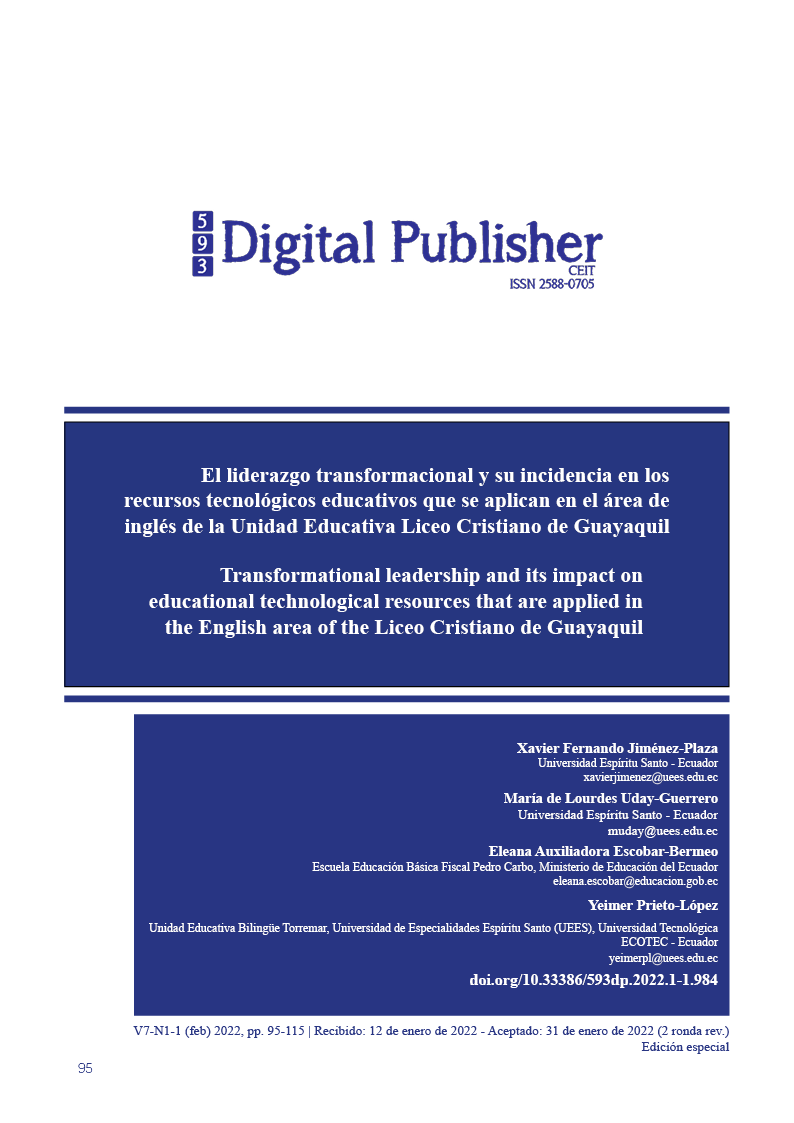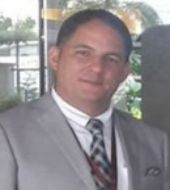El Transformational leadership and its impact on educational technological resources that are applied in the English area of the Liceo Cristiano de Guayaquil.
Main Article Content
Abstract
The challenges and changes in today´s educational environment make leadership a top priority for educational institutions and teachers. This scientific research article offers the results of a study on a new transformational leadership in the use of educational technological resources that will be applied by teachers in the English area of the Liceo Cristiano de Guayaquil Educational Unit. As an objective, the execution of a training plan is proposed, which will serve so that teachers, especially in the area of English, face new challenges in the use of technological resources to improve and make the teaching and learning process effective. Indeed, the research is of a non-experimental and exploratory design under a mixed approach. The application of scientific methods such as theoretical systematization and logical history; and as an empirical method of measurement, it will help us to search for information, the results of which are describable, measurable and verifiable in the investigation. The population and sample is made up pf 10 teachers from the area of English, as the object of study. For the data collection of the variables, the virtual interview technique was applied, with a multiple-choice questionnaire, with the Likert-type scale. The statistical treatment used in an Excel matrix generated by the Google Forms tool. An expert interview was also conducted with managers, heads of areas and experienced teachers. The results were analyzed at the descriptive-explanatory level with a mixed, qualitative and quantitative approach for the variables under study. The results made it possible to systematize the conclusions, recommendations and proposal. With the contribution of this research article, educational institutions have a reference to promote changes towards a new transformational leadership in the use of new technological resources to improve educational quality.
Downloads
Article Details

This work is licensed under a Creative Commons Attribution-NonCommercial-ShareAlike 4.0 International License.
1. Derechos de autor
Las obras que se publican en 593 Digital Publisher CEIT están sujetas a los siguientes términos:
1.1. 593 Digital Publisher CEIT, conserva los derechos patrimoniales (copyright) de las obras publicadas, favorece y permite la reutilización de las mismas bajo la licencia Licencia Creative Commons 4.0 de Reconocimiento-NoComercial-CompartirIgual 4.0, por lo cual se pueden copiar, usar, difundir, transmitir y exponer públicamente, siempre que:
1.1.a. Se cite la autoría y fuente original de su publicación (revista, editorial, URL).
1.1.b. No se usen para fines comerciales u onerosos.
1.1.c. Se mencione la existencia y especificaciones de esta licencia de uso.
References
Acuerdo N° MINEDUC-2021-00064-A. (2021). Flexibilidad en el currículo. (pág. 5). Quito: Ministerio de Educación.
Alconada Fernández, C., Brazueki Grund, F., Cabañes M., Cacheiro, G., Barros, D.M. (2016). Recursos tecnológicos en contextos educativos. Madrid: UNED.
Astudillo, M. (2018). Aplicaicpon de las Tic como herramienta de aprendizaje en la Educacipon Superior. Revista Cientpifica Mundo de la Investigación y el Conocimiento, 585-598. Obtenido de https://doi.org/10.26820/recimundo/2.(2).2018.585-598
Cabrera, B. (2016). La estrategia pedagógica como escenario de acción para el mejoramiento del desempeño profesional de los docentes de la Universidad Católica de Cuenca. Revista Cubana de Educación Superior, 41-50.
Carneiro, R., Toscano, J. C., & Díaz T. (2021). Los desafíos de las Tics para el cambio educativo. España: Madrid: Fundación Santillana.
Cifuentes Páez, P. (2016). Desarrollo y Perfeccionamiento del liderazgo en la práctica docente. Tesis de Maestría en educación con énfasis en procesos de enseñanza aprendizaje. Tecnológico de Monterrey, Colombia.
Cueva, J., García, A., & Martinez, O. (2019). El conectivismo y las Tic: Un paradigma que impacta el proceso enseñanza aprendizaje. Revista Scientific, 4)14),, 205-227, e-ISSN: 2542-2987. Obtenido de http://www.indteca.com/ojs/index.php/Revista_Scientific/article/view/315
González, N., & Rada, N. (2017). Estrategias para la potenciación de líderes transformacionales juveniles. Revista de Ciencias Sociales (RCS), 82.
Guerra, L. M., & Valladares, L. M. (2016). Estudio sobre la Incidencia del uso de los recursos tecnológicos educativos en el rendimiento académico. 3.
Hernández Sampieri, R. F. (2019). Metodología de la investigación. México. D. F: McGraw-Hill.
Hernández, S. R, Fernández, C. C y Baptista, L. P. (2015). Metodología de la Investigación. México: McGraw-Hill Interamericana.
Hernández, Sampieri, R. (2018). Metodología de la Investigación (Sexta ed.). México: Interamericana Editores.
MinEduc. (2020). Lineamientos para la Construcción de la Propuesta Pedagógica. Quito.
MINEDUC. (2020). Lineamientos para la construcción de la Propuesta Pedagógica (Tercera ed.). Quito, Ecuador.
Moreira, M. A. (2017). ¿Qué es la Tecnología Educativa? Obtenido de https://manarea.webs.ull.es/materiales/investec/1tecno.html
Morin, J. (1992). Des technologies, des marches et des hommes: practiques et perspectives du management des ressources technologiques. Paris, Francia: D´Organisation.
Palacios, Juan Carlos. (2015). Plataforma virtual de sofwaare libre (EDMODO) para el apoyo de la enseñanza de lengua extranjera (inglés) en estudiantes de décimo año de EGB, Unidad Educativa "De La Inmaculada". Universidad Cengtral del Ecuador.
Rojas Carrasco, O. A., Vivas Escalante, A. D., & Mota Suárez, K. T. (2020). El liderazgo transformacional desde la perspectiva de la pedagogía humanista. Sophia. Colección de Filosofía de la Educación. Obtenido de Obtenido de file:///C:/Users/Neida%20Gonzalez/ Downloads/3182-Texto%20del%20art%C 3%ADculo-22615-1-10-20200114.pdf
Serrano,S, J; Gutiérrez, I & Prendes, E, M. (2016). Internet como recurso para enseñar y aprender. Una aproximación práctica a la tecnología educativa.
Silva, M, García, T., y Chaparro, R. (2016). Estudio de herramientas Moodle para desarrollar habilidades del siglo XXI. Campus Virtuakes, 58-69. Obtenido de http://uajournaks.com/ojs/index.php/camousvirtuales/article/view/126
Tobon, M. (2018). Prácticas pedagógicas. Espacios.
Vidal Cruz, C. A. (2017). El liderazgo transformacional como herramienta en la Gestión de Equipos de Trabajo. Bogotá Colombia: Universidad Militar Nueva Granada. Obtenido de Obtenido de https:// repository.unimilitar.edu.co/bitstream/ handle/10654/16256/VidalCruzCarolAndr ea2017;jsessionid=FAC47A8B789BABB C5D957C9791207B1C?sequence=





